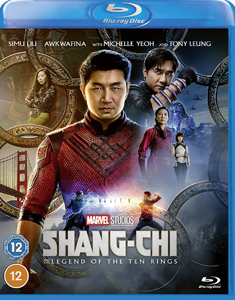“Shang-Chi and the Legend of the Ten Rings” is a successful product from the offices of Marvel Studios. The special effects showcase Chinese cultural imagery with martial arts and dragons. Fight scenes and battles are bluntly spectacular. It checks the box of giving Asians their MCU entry.
Drawn from history
At the end of the day, though, I know I’ve seen a product. The source material is an even longer-titled comic book, if you can believe it: “The Hands of Shang-Chi, Master of Kung Fu,” which ran from 1974 to 1983. Martial-arts-crazy 1974 also saw the launch of “Iron Fist,” which was made into a Netflix series, but “Shang-Chi” dispenses with the white savior trope.
Simu Liu stars as Shaun – which friend Katy (welcome comic relief Awkwafina) notes is a lame Americanization if you’re in hiding. He ends up hiding in his own movie.
Liu shares acting chores with Jayden Zhang and Arnold Sun as younger versions of Shaun in flashbacks. What’s more, Shaun’s sister Xialing (Meng’er Zhang) emerges as a co-lead. Director/co-writer Destin Daniel Cretton goes through a lot of machinations, but ultimately this the story of an adult brother and sister dealing with an unhinged father (Tony Chiu-Wai Leung as Xu).
“Shang-Chi and the Legend of the Ten Rings” (2021)
Director: Destin Daniel Cretton
Writers: Dave Callaham, Destin Daniel Cretton, Andrew Lanham
Stars: Simu Liu, Awkwafina, Tony Chiu-Wai Leung
Xu possesses the 10 rings and therefore has the power to go to his deceased wife’s secret village of Ta Lo and free a monster that’s magically bound in a cave. He thinks – thanks to the monster giving him false visions — his wife is trapped there (even though he saw her corpse, went to her funeral, etc.).
MCU tie-ins
Cretton fails to achieve a sense of mystery; we always know Xu is being tricked – which is rather pathetic for a major villain. Especially when considering Xu’s full backstory. He is thousands of years old.
And one of the names he has gone by is The Mandarin – a moniker stolen from him by another villain in “Iron Man 3,” to his mild annoyance and to the serious annoyance of comic-book nerds who successfully got that Shane Black romp labeled as one of the “bad” MCU films.
“Shang-Chi” cleverly ties into “Iron Man 3,” not to mention “Doctor Strange.” And it hands the baton to next year’s “Doctor Strange and the Multiverse of Madness.” These linkages are kind of fun and probably well thought-out by Phase 4’s shapers.

Dysfunctional family
Cretton is less successful within “Shang-Chi” itself. Xu trains Shaun to be a warrior but does not train Xialing (although she learns anyway, on her own). “Shang-Chi” wants to make broad statements about Chinese cultural history but doesn’t notice they don’t fit with these characters. Xu loved his wife in part for her fighting abilities; it makes no sense that these parents would forbid Xialing from martial arts lessons.
“Shang-Chi” can’t have it both ways. So Cretton and co-writers Dave Callaham (“Wonder Woman 1984”) and Andrew Lanham are content to graft a yarn onto the proven MCU template. They pay lip service to the Chinese cultural experience and the Chinese-American experience (Shaun has been in San Francisco for a decade before his call to action).
And in the prologue showing how Xu gets the 10 rings, everyone speaks Mandarin and we Westerners must read the subtitles.
Not exactly Father of the Year
But really, we’ve seen this before: Shaun’s journey is a lot like Peter Parker’s, complete with a formative cage match where he’s billed as “Bus Boy.” It’s also a family drama grafted on to an epic template.
In retrospect, every single fight scene occurs because Xu is off his rocker. He openly admits that he sent his warriors after Shaun knowing that Shaun would defeat them. It’s not even a test; it’s frivolity.
After the film, I reflected on the fact that Xu led a lot of elite warriors to their demises on a speeding bus and skyscraper scaffolding … on a whim. Why do the surviving warriors stay loyal to this dude? I guess it’s the only life they know, but still.
Spectacle wins the day
In a vacuum, though, these fights are awesome, starting with the second-best bus fight of the year. I give an edge to the gritty brawl in “Nobody,” but the style here is a lot of fun. Bamboo scaffolding is a less common location for a brawl (although not unheard of, as “Push” did it), and it’s wonderfully rendered with sweeping camera work through a dark blue and purple nightscape.
Later, Katy drives our heroes through a moving maze of trees to get to the hidden village of Ta Lo. It’s harrowing and requires an especially sensitive guide. But when another group comes through the trees, they do it without trouble, off screen. See, that action sequence had already been done.
Oddly, by the time the fights and action mean something (the fate of the world, naturally), I was somewhat tired of the ride.
Film peters out
The creature design is excellent – a highlight is an oversized, winged Tribble that gurgles like a Mogwai. But when good and evil dragons swirl and growl at each other in the sky, it’s like “Yeah, movie, you’ve proven your design prowess. We get it.” Character arcs peter out as we realize they weren’t as deep as the visuals and sweeping score suggested.
An early fight between future husband and wife is less spectacular than the dragon battle. It’s “Crouching Tiger” stuff we’ve seen before. But we’re stepping into what we hope will be a fresh journey.
“Shang-Chi” doesn’t live up to that early promise. And with Katy abruptly given over to a serious arc about contributing to the team, the humor disappears.
“Shang-Chi and the Legend of the Ten Rings” bows out before it overstays its welcome, and it was mostly a fun ride. Its ambition to tell a new type of story – or even a notably Eastern type of story – doesn’t come close to matching the thrills, though.

